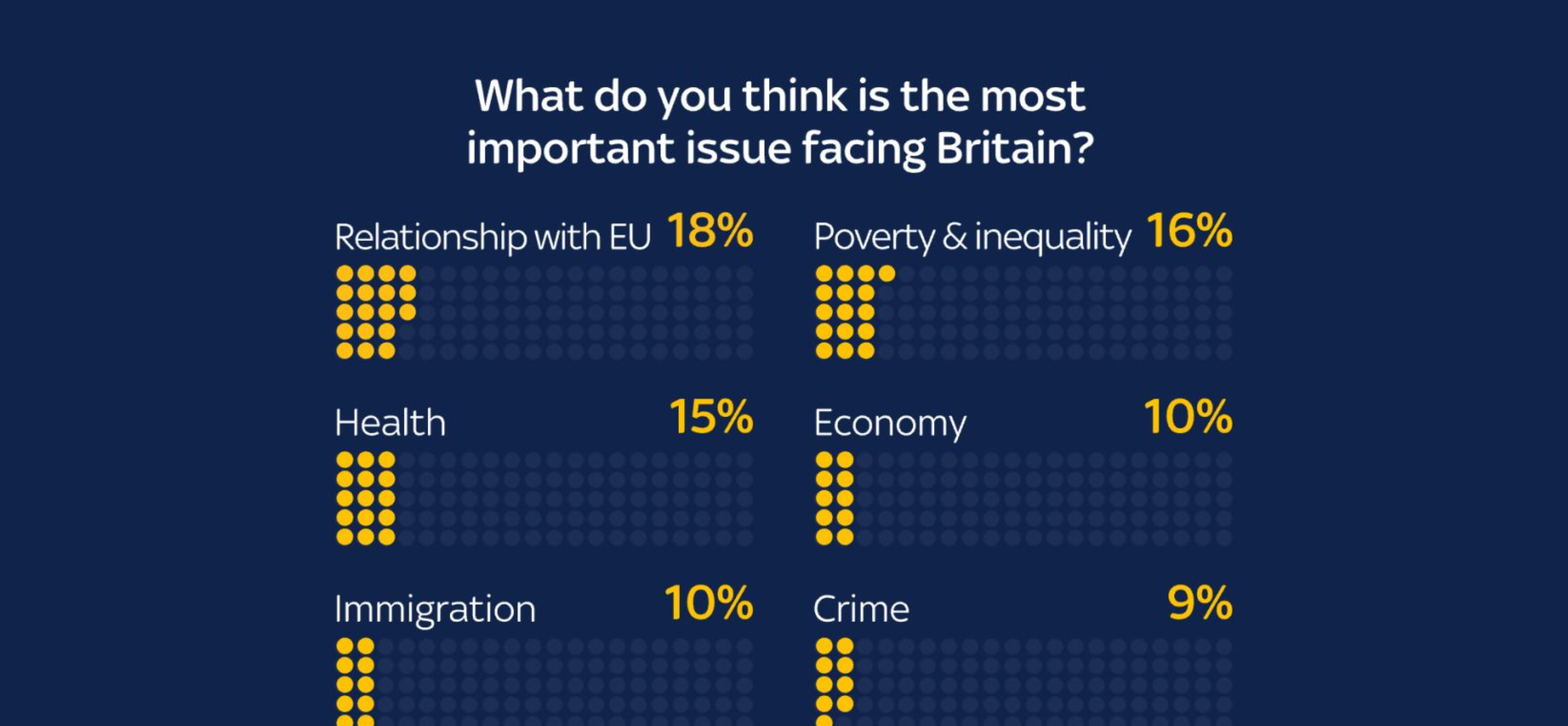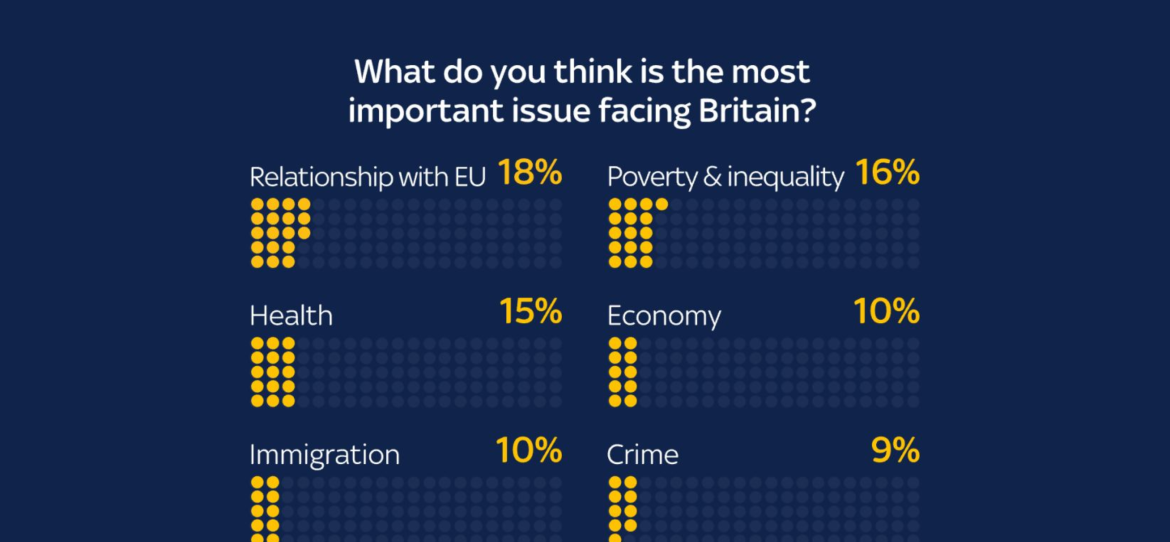-
 play_arrow
play_arrow
BayRadio Listen Live Broadcasting in Spain


Brexit continues to divide Britain despite Boris Johnson’s declaration it is over, according to the new Sky Data poll.
It found Brexit remains the top issue of concern for voters on 18%.
This puts it ahead of poverty and inequality (16%), health (15%), and the economy and immigration (10%).
Despite being the most important issue, Brexit has dropped significantly from 33% in the last poll in October 2019.
The Sky Data poll found people do think Brexit will be good for themselves and good for the country, but by very narrow margins.
37% of those polled were positive, with 34% worried about Brexit and 29% not sure.
As for what impact it will have on the country, 45% say it will be good, 40% bad and 15% say they do not know.
It seems the public enters the year slightly more optimistic than last. There has been a slight improvement in expectations about the national economy – with 32% thinking it will get better in 2020, compared to 18% in October, before the election. Expectations about personal finances have improved too, though by a smaller amount.
Despite that more positive outlook, there remains considerable gloom about the final Brexit deal, with 42% of people thinking the deal will be bad – admittedly an improvement on last October (50%) and the year before that (66%).
When it comes to negotiations, 48% think the government is doing a bad job, while 32% think they are doing well.
But it seems the prime minister is enjoying a honeymoon of sorts with voters, with the public’s satisfaction in him rising six points.
It now stands at 52% – the highest rating achieved by the incumbent of Downing Street in over two-and-a-half years, shortly before Theresa May’s popularity imploded during the 2017 election campaign.
While approval of the government remains at a low level by historical standards, it is also substantially up since the autumn – standing at 35% compared to just 22% last time.
Mr Johnson now has dominant authority over the Conservative Party, having delivered a substantial parliamentary majority and, for now at least, solved the problem of leaving the EU.
This is reflected in the party’s public image.
Last October, 74% of people thought the party was divided. Now, that figure is just 25%. This dramatic change puts the government in a strong position as it negotiates the future shape of Britain’s relationship with the EU.
The Conservatives’ opponents, by contrast, are dispirited and fractious.
Labour is seen as badly split. Nearly four in five people consider the party to be divided, while 76% express dissatisfaction with Jeremy Corbyn, who steps down as leader in April. Labour’s new leader faces a tough task in restoring confidence in the party.
The Sky Data poll asked respondents to select up to three qualities required of that new leader as the party tries to rebuild.
Top of the list, with 45%, was the ability to listen to what voters say. It is followed by being in touch with ordinary people (37%), being trusted on the economy (36%), and offering a change from Corbynism (31%).
Only one in 20 of Labour voters believe the party needs to elect a woman and just one in seven see tackling antisemitism as a priority.
With Jo Swinson ejected from parliament at the general election, the Liberal Democrats find themselves under a relatively unknown and unpopular leader. Half the public don’t have an opinion about acting co-leader Ed Davey, with just 12% satisfied with his performance.
The public do have clearer views about the head of the Brexit Party, Nigel Farage, however. Almost three in 10 are satisfied with his leadership, a figure which rises to 54% among those that voted to leave the EU. But exactly half of the respondents are dissatisfied by arguably the most polarising figure in British politics.
Beyond Brexit and British politics, as a new decade begins, we asked people about the likelihood of some key events that may or may not happen in the next 10 years.
It is a sobering thought that 45% of people currently think that another world war is very likely or somewhat likely to happen in that time period – and 85% believe UK military forces will be involved in an overseas conflict. Two-thirds of our respondents also expect a global economic recession.
Optimism is in short supply.
Only one in eight expect climate change will be brought under control and fewer people than that see an end to the refugee crisis. Meanwhile, half believe that a cure for cancer may be discovered in the next decade, more than eight in 10 think more diseases will become resistant to antibiotics.
This downbeat mood reflects a wider public sentiment of negativity towards politicians and institutions generally.
One in five, for example, express zero trust in the Westminster parliament and British politicians generally. One in four hold that view of the European Union.
While judges and civil servants are deemed more trustworthy, that certainly cannot be said of Donald Trump with 48% declaring no trust at all in the US president, who faces re-election this November.
Written by: BayRadio News
Similar posts
Recent Posts
- Robotic Surgery for Prostate Cancer: What Is Radical Prostatectomy and How Does the Da Vinci Robot Improve It
- What Is Fibromyalgia? Symptoms and Treatments of an Invisible Illness That Requires Specialized Attention
- AMASVISTA Glass: 10 reasons to choose SUNFLEX glass curtains
- Robotic Surgery, Immunotherapy and Comprehensive Care Take Centre Stage at Pancreatic Cancer Conference at Quirónsalud Torrevieja
- Robotic Surgery Against Ovarian Cancer: Greater Precision, Less Pain and Faster Recovery

Ctra. Cabo La Nao, CC La Nao, Local 6 03730 Javea, Alicante, Spain
Advertise with us
Do you have a business in Spain? Do you provide a service to the expat community in Spain? Would you like your message to reach over 500.000 people on a weekly basis?
BayRadio is a community orientated radio station offering fantastic content to our many listeners and followers across our various platforms. Contact us now and find out what Bay can do for you!
Our business is helping your business grow.
BAY RADIO S.L. © 2024. ALL RIGHTS RESERVED. WEB DESIGN BY MEDIANIC







